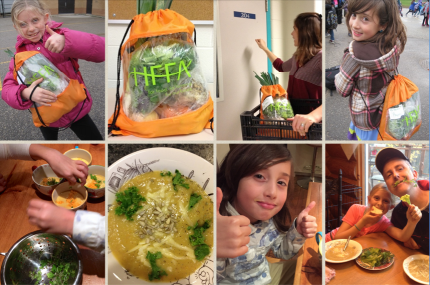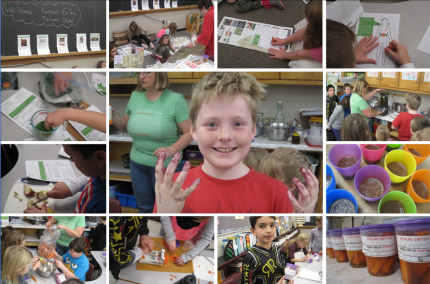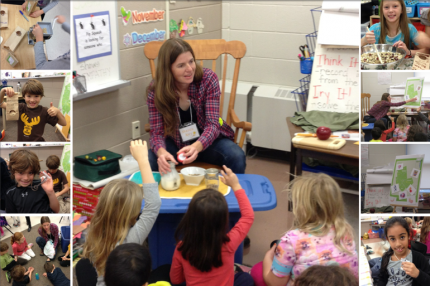Bringing the Farm (and Farmer) to School in the Headwaters Region
Posted: January 26, 2015
Categories: Edible Education Network / Edible Education Project Profiles / GoodFoodBites / News from Sustain Ontario
The Headwaters Food and Farming Alliance  (HFFA), a project of Headwaters Communities In Action, is a new collaborative initiative with a vision to foster the local food system in Dufferin County, Caledon and Erin, Ontario.
(HFFA), a project of Headwaters Communities In Action, is a new collaborative initiative with a vision to foster the local food system in Dufferin County, Caledon and Erin, Ontario.
As part of that vision, this school year they were able to launch two Farm to School pilot programs, made possible through a Local Food Fund grant from the Government of Ontario, along with fundraising efforts required to match the grant funds.
In their education workshops, HFFA is sending farmers directly to school classrooms. The program, which is offered free to select schools during the pilot period, pairs local farmers with schools throughout the region for class visits to teach students about the local food system and farming life. The engaging activities and curriculum-linked lesson plans span from kindergarten to grade 6.
To extend the learning from school back to home, they’ve also organized a Local Food Club similar to a food box or farm share program, where individuals and families can purchase memberships and receive monthly packages containing food samples, information about seasonal food and producers in the Headwaters region, as well as recipes and nutritional information. The packages are distributed through participating schools.
The team is thrilled to announce that the project was selected as a First Prize Category Champion in the Health and Well-being category of the CST Inspired Minds Learning Project, for which they are being awarded $5,000 to support the programs!
So it’s no surprise that the programs have already been seeing great success: 100% of teachers rated ‘excellent’ on a feedback survey (more below), and kids are eager to meet the farmers, to try cooking or eating new foods, and showing enthusiasm toward healthy food!
Like one grade 7 boy, who having brought in money specifically for kale, was disappointed when there was no more left – the last bunch had just been sold to another grade 7 boy! But, the kale was shared, and the students walked down the hall taking bites right out of the leaves.
Now isn’t that what we all want to see?
By the end of January, they expect to be about half way through the Local Food Fund grant outcome objectives. To date they’ve reached about 300 minds and bellies of children, parents, teachers, school staff and farmers through both programs.
Jennifer Payne, Farm to School Program Coordinator for Headwaters Food & Farming Alliance, answers some more detailed questions below about the HFFA F2S pilot programs:
How is your program funded?
The Headwaters Food and Farming Alliance is a project of Headwaters Communities In Action, growing out of the first Headwaters Food Summit, which was held in 2012 (where Jennifer first got involved in this work as a volunteer). The Food Summit really stirred up enthusiasm and passion for local food and farming, and it was from that the Headwaters Food and Farming Alliance was born – that group evolved into discrete working groups around a coordinating hub.
Headwaters Communities In Action and The Children’s Foundation of Guelph and Wellington co-applied for a Local Food Fund Grant, and put up a portion of the matching funds required. The remainder is being raised through various means, including ticketed events, the sale of memberships in the Local Food Club and a sponsorship option for community groups.
How did you first engage the schools and communities?
The approach has so far been rather organic, starting with existing connections within our working group of volunteers. From the beginning of our organization’s existence, we’ve been lucky to have the regular commitment of Public Health nurses, Registered Dietitians, the Director of the Food & Friends network of student nutrition programs, farmers with school connections and lots of parents with school-aged children.
We engaged with the school board through our EcoSchools coordinator who is also a curriculum leader and was very receptive to our proposal. She shared the newly revised curriculum documents with us so that we could ensure up-to-date connections.
We thought that we would need the board’s stamp of approval before we could approach teachers, but once we started telling people about it, it didn’t take long before passionate teachers were asking to book for their class.
We also have the great advantage of being close enough to Everdale Environmental Learning Centre in Hillsburgh to be able to partner with them and extend the great work they have already done developing and perfecting program elements for each grade level through their Farmers-in-the-Schools program. Yet we are far enough away that we don’t directly compete with them. Where our regional boundary overlaps with the area they service, they may deliver the program with both hats on.
What did you use to make your case for support?
This is not a hard principle to sell. We have yet to meet someone who is not in favour of connecting children and families to local food and farming. There are, of course, lots of good questions that come up around how we go about doing that, and rightly so. It helps us to test our mandate and motivations and make sure our approach is well rooted and defensible. But philosophically, the support is already there.
Financially, we haven’t fully ramped up our fundraising and sponsorship campaigns yet. However, we have found schools quite willing to find funds for class workshops. As a pilot program, we felt that we needed to be able to experiment, possibly make mistakes and take away lessons to improve the program without financial risk to the school, so we are offering two class workshops per school free of charge. They have been popular enough, however, that additional teachers are interested and ready to pay.
What tips do you have for others?
Have clear language about what you are doing and why. What does your project hope to achieve and what does your organization stand for? Have a solid “elevator pitch” (a few lines that sum up your group and project) that people can remember and repeat, and have a short presentation and hand-outs available for meetings and chance conversations.
Choose your scope carefully and stick to it, and be prepared for success! If it’s a good project, you may get a better response than you anticipated and it can be difficult to say no to interested parties. However, if you haven’t yet planned to scale up, it can get out of hand. That’s why it’s helpful to have a pilot phase where you can manage the scale.
It sounds cliché, but plan the work and work the plan. One of the biggest challenges is the strict timing and schedules we’re working with. Be keenly aware of calendars and schedules of the various players. Plan ahead as much as possible, but be prepared to reschedule! Farmers, teachers and volunteers are busy at different times of the year – and even different times of day – so it can be difficult to get them into the same room for planning.
Make decisions easy for your audience and prospective participants. Know exactly what you want, and when you want it, i.e. commitment of time, paperwork completed, date and time options. Open-ended emails and inquiries can take longer to resolve, especially when you’re limited to emailing.
Take lots of pictures and get media releases so you can share your stories!
What was one of the biggest challenges you’ve come up against?
The biggest challenge for us has been timing. Our carefully planned schedule for the project experienced delays in the approval process for the grant, the availability of farmers for training, the availability of teachers and board representatives for consultation on the education components and other unexpected hurdles.
Timing is also the issue with the Local Food Club, as we don’t always know what’s available and so lining up a recipe with locally-available ingredients is often cut a little closer than we would like. We’re looking at different ways of looking ahead to plan for supply.
What factors were critical for your success?
Accommodating farmers, teachers, and other champions at the schools, who are willing to work through the kinks with us as we refine the details.
Also, having a dedicated paid coordinating resource and support structure in the organization is critical to keep things on track and moving forward.
 Impact
Impact
It’s still early days for us, but we have had a lot of positive comments from the participants as we’re doing things in the schools. In the formal feedback we’ve received from surveys filled out by teachers (100% rated Excellent!) and Local Food Club members, the response has been very positive, with some constructive feedback that will help us improve our content and messaging. People really seem to like the surprise aspect of not knowing what they’ll get until the package comes home. People have commented that they are learning new things from our information packets. To us, that’s a good outcome!
When you plan a program like this, many people lament the fact that kids today don’t know real food or where it came from, but we’re seeing a healthy balance in the students we engage. True, some don’t know a potato from a cauliflower, but others are giving us their pumpkin recipes and talking about how they make healthy food choices! When you walk into a school with food, it doesn’t take long to spark curiosity and get kids excited.
One particularly heartwarming memory witnessed through our work was a grade 2 boy who was nervous about being “volunteered” by his teacher to participate in a pumpkin loaf baking activity.
“But I don’t know anything about pumpkin and I’ve never done anything like that before,” he had said.
But he came, he measured, he stirred and poured, then served pumpkin loaf to his class. Afterward he told his teacher, “that was awesome! I want to do that all the time!”
Contact:
Jennifer Payne
Farm to School Program Coordinator
Headwaters Food & Farming Alliance
food@headwaterscommunities.org
Check out the latest HFFA Local Food Club newsletter (it includes a vegetable curry recipe!)
This profile is part of a series of profiles for the Ontario Edible Education Network.
Be sure to check out more profiles from the Network here!
